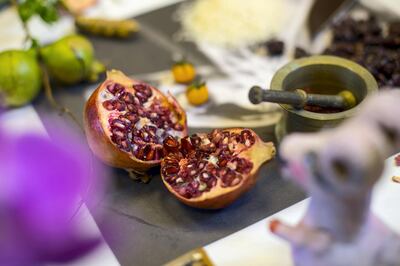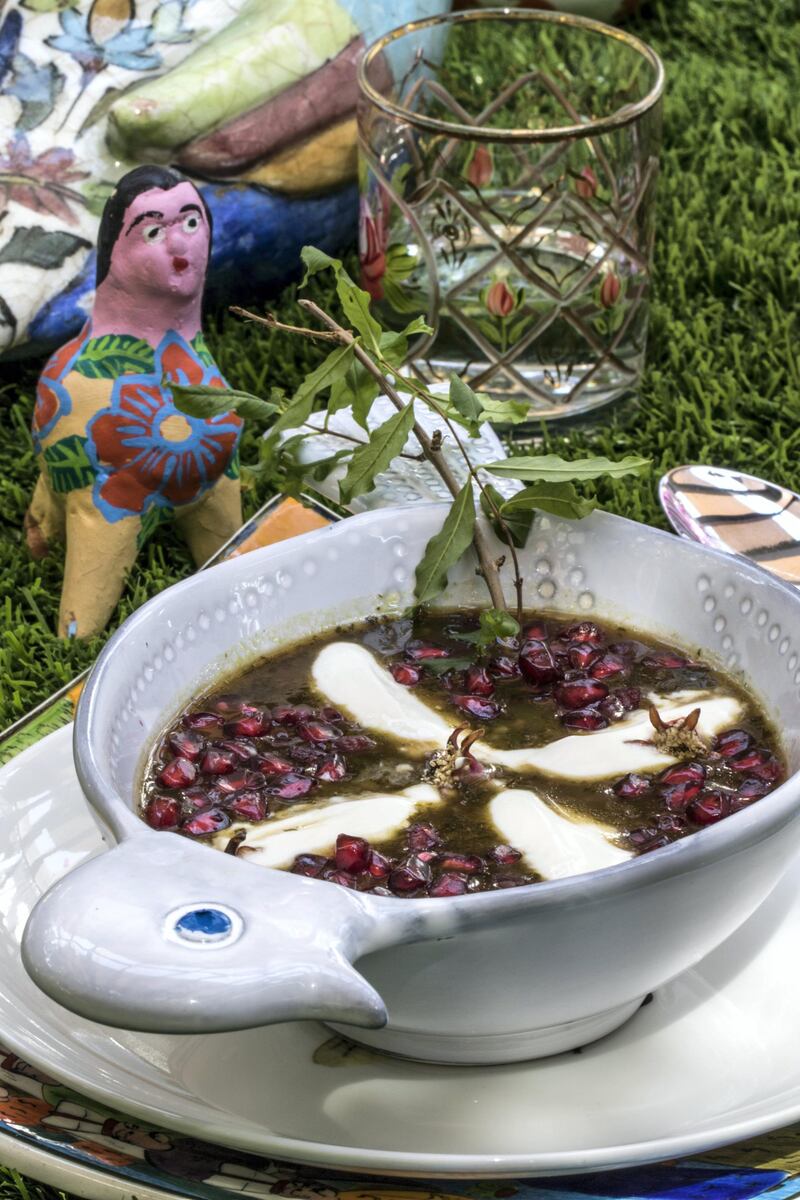Join The National and Table Tales on a culinary journey around the Middle East to savour the quintessential dishes that embody the spirit of Ramadan. From table staples to family favourites, this series of recipes – one for each day of Ramadan – pays homage to the holy month and the home cook alike.
Pomegranates, or anar in Farsi, have been cultivated in Iran and the Caspian region for centuries. They hold a special place in Persian mythology, being associated with marriage, fertility and renewal. In Islam, ruman (pomegranates in Arabic) are symbols of the Creator's abundance; in Christianity, they represent resurrection and eternal life; and in Judaism, they are traditionally eaten on Rosh Hashanah (New Year).
Pomegranates have re-emerged in contemporary culture and cuisine, valued as they are for their antioxidants, and are used in sweet and savoury dishes.
Hanan Sayed Worrell of Table Tales says: “This pomegranate soup recipe is from my friend, Nazzy. It captures the principles of harmony in Persian food, as she explains, with elements that cool the body – the pomegranates – and those that lend energy and heat – the honey.
“This recipe takes time to prepare and patience to cook, but the result is well worth it. It is traditionally made with meatballs, but this one is vegetarian. And as with all soups, it is more flavourful a day or two after it’s been prepared.”

Nazzy Scarlett's asheh anar (pomegranate soup with green herbs)
Serves 6 to 8
Ingredients for the soup:
- 120g yellow split peas, dry
- 400g parsley
- 255g fresh coriander
- 200g mint
- 140g chives
- 120ml olive oil
- 225g onion, chopped
- ½ tsp turmeric
- 1 tsp chilli powder
- 100g jasmine rice
- 1 tsp salt
- 1,000ml pomegranate juice
- 80ml pomegranate molasses
- 60ml honey
- Salt and black pepper, to taste
- 2 tbsp tomato paste
- 55g butter
Ingredients for the garnish:
- Greek yoghurt
- Fresh marjoram
- Pomegranate seeds
______________
Read more:
Ramadan recipes: daily dishes to try from the 'Table Tales' series
Ramadan recipe: maqluba – upside-down lamb, aubergine and rice
Ramadan recipe: luqaimat – sweet dumplings
______________
Method:
- Rinse and soak the split peas for a couple of hours or overnight; drain.
- Pour one litre of water into a large saucepan, add the peas, and bring to a boil. Cook on a rolling boil for 30 minutes or until the peas are al dente; do not drain. Skim the foam from the surface of the water as necessary.
- Finely chop the parsley, fresh coriander, mint and chives all together in a food processor or by hand.
- Heat the oil in a Dutch oven and add the onions. Saute for a few minutes until golden.
- Stir in the turmeric and chilli powder. Add the rice, herbs, and split peas with their liquid.
- Add the salt and pomegranate juice, and bring to a boil.
- Pour in one litre of water, cover and return to boiling. Reduce the heat and let the soup simmer for 45 to 60 minutes, until the peas are cooked.
- Combine the pomegranate molasses and honey; taste and adjust to balance the tartness and sweetness. Drizzle the pomegranate molasses/honey mixture into the soup and let it simmer for one hour, stirring occasionally so the herbs don't stick to the bottom of the pan. Add salt and pepper to taste.
- Add the tomato paste and more water if needed and continue to simmer for two hours. Check the flavours and add salt if necessary.
- Add the butter and give it one more stir. The herbs, rice and peas will be completely creamed and the consistency should be thick.
- Garnish each serving with a dollop of yoghurt, a sprinkle of marjoram or other green herbs, and some pomegranate seeds.
This dish has been brought to you by Nazzy Scarlett and curated by international recipe hunter Hanan Sayed Worrell, author of Table Tales: The Global Nomad Cuisine of Abu Dhabi. The Table Tales concept celebrates the people and stories that give flavour to recipes of the Middle East.







